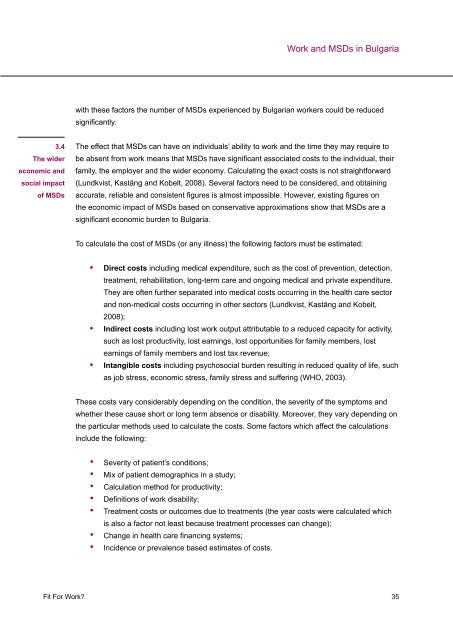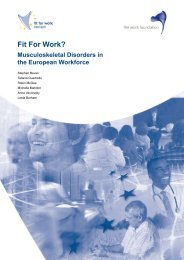FfW Bulgarian report (English language) - Fit for Work Europe
FfW Bulgarian report (English language) - Fit for Work Europe
FfW Bulgarian report (English language) - Fit for Work Europe
You also want an ePaper? Increase the reach of your titles
YUMPU automatically turns print PDFs into web optimized ePapers that Google loves.
3.4<br />
The wider<br />
economic and<br />
social impact<br />
of MSDs<br />
<strong>Work</strong> and MSDs in Bulgaria<br />
with these factors the number of MSDs experienced by <strong>Bulgarian</strong> workers could be reduced<br />
significantly.<br />
The effect that MSDs can have on individuals’ ability to work and the time they may require to<br />
be absent from work means that MSDs have significant associated costs to the individual, their<br />
family, the employer and the wider economy. Calculating the exact costs is not straight<strong>for</strong>ward<br />
(Lundkvist, Kastäng and Kobelt, 2008). Several factors need to be considered, and obtaining<br />
accurate, reliable and consistent figures is almost impossible. However, existing figures on<br />
the economic impact of MSDs based on conservative approximations show that MSDs are a<br />
significant economic burden to Bulgaria.<br />
To calculate the cost of MSDs (or any illness) the following factors must be estimated:<br />
• Direct costs including medical expenditure, such as the cost of prevention, detection,<br />
treatment, rehabilitation, long-term care and ongoing medical and private expenditure.<br />
They are often further separated into medical costs occurring in the health care sector<br />
and non-medical costs occurring in other sectors (Lundkvist, Kastäng and Kobelt,<br />
2008);<br />
• Indirect costs including lost work output attributable to a reduced capacity <strong>for</strong> activity,<br />
such as lost productivity, lost earnings, lost opportunities <strong>for</strong> family members, lost<br />
earnings of family members and lost tax revenue;<br />
• Intangible costs including psychosocial burden resulting in reduced quality of life, such<br />
as job stress, economic stress, family stress and suffering (WHO, 2003).<br />
These costs vary considerably depending on the condition, the severity of the symptoms and<br />
whether these cause short or long term absence or disability. Moreover, they vary depending on<br />
the particular methods used to calculate the costs. Some factors which affect the calculations<br />
include the following:<br />
• Severity of patient’s conditions;<br />
• Mix of patient demographics in a study;<br />
• Calculation method <strong>for</strong> productivity;<br />
• Definitions of work disability;<br />
• Treatment costs or outcomes due to treatments (the year costs were calculated which<br />
is also a factor not least because treatment processes can change);<br />
• Change in health care financing systems;<br />
• Incidence or prevalence based estimates of costs.<br />
<strong>Fit</strong> For <strong>Work</strong>? 35







